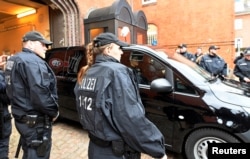German prosecutors have asked a regional court to allow the extradition of former Catalan separatist leader Carles Puigdemont, who faces a rebellion charge in Spain for organizing an independence referendum.
Puigdemont initially fled Spain to Belgium after the vote, but has been held in Germany since being arrested there on March 25.
He said during an interview with a German news website that those who want independence for the northern Spanish region are not criminals.
"We want to decide our own future — is that a crime? We used ballot boxes — is that a crime?" Puigdemont asked during the jail cell interview. "We were elected by the people, so what is the problem with the Spanish authorities? Why don't they start politics in order to solve a political problem?"
The French News Agency reported Puigdemont's attorney has appealed against the Spanish Supreme Court's decision to prosecute him on the rebellion charges. The lawyer argued the charge implies Puigdemont advocated an uprising by violence. He said any violence that followed the October referendum was isolated and does not justify the charges.
Twenty-four other Catalan separatist leaders are also facing rebellion charges.
Pro-independence lawmakers won a slim majority in December's parliamentary elections in Catalonia. But parliament has been unable to name a new president since Puigdemont fled, and the future of independence is murky.
Catalonia, in northeast Spain, and its capital Barcelona are major tourist magnets. It has its own language and distinct culture. But the separatist crisis has hurt tourism and the regional economy.
Catalan separatists call the region a powerful economic engine that drives Spain, and they have demanded more autonomy.
Those who want to stay united with Spain fear the region will sink into an economic abyss without the central government, its ties to the European Union, and its numerous existing bilateral relations.






